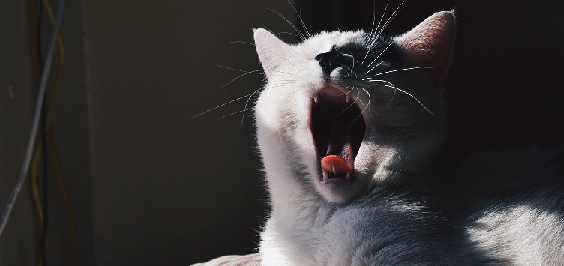What could be causing my cat’s chronic sneezing and how can we get it to stop?
Original Question: Good morning Dr. Greenway. I have a 7-year-old cat named Willy who is a rescue Ragamuffin. For about the last year he has been sneezing about 4 or 5 times a day otherwise he is very healthy. Nothing has changed that I can think of. - Jeanne
 Mar 5, 2018
Mar 5, 2018
Hi Jeanne,
Thanks for your question.
So as veterinarians we hear this type of problem all the time in our cats. They are known to get upper respiratory tract infections. Most of them are harmless bacterial infections that go away when they’ve been put on an antibiotic. Whenever these infections return and are chronic or resistant to treatment, I always start thinking about the fact that there may be an infectious entity other than bacteria at play here.
Many cats from shelters can have viruses. Any cat that used to live outdoors has a higher chance of getting a virus that it may have for a lifetime. These viruses can either reduce the immune system’s ability to fight infection or create problems in the airway that predispose the cat to infections. There are some common viruses that do this. Feline leukaemia virus and feline immunodeficiency virus are two common viruses that can easily be tested for by your veterinarian and can cause chronic upper respiratory tract infections because they allow a bacterial infection to stay active and not clear up. My first recommendation is you have your veterinarian perform a blood test to determine if this is the case.
There are some other entities you can test for as well. You could perform an upper respiratory tract panel which can culture various bacteria or even look for infectious agents by DNA testing. Some of these other agents may respond more significantly to one antibiotic over another. Treatment with the right antibiotic would be valuable in the case of some of these entities. Performing these tasks would be a good second step.
Beyond that, the thing I worry about the most is when an upper respiratory tract infection has been going on for years. This can cause a lot of damage to the epithelium within the nasal cavity and sinus is leading to scarring. When there is damage to the tissue then antibiotics have a hard time reaching the sites where the bacteria are active. In these cases it’s often beneficial to consider a nasal flush. If your cat is having a routine general anaesthetic you can add this to the entire procedure and it should be very simple. I would only consider this after some initial testing has been done and possibly some other treatment trials of different antibiotics have been performed. It’s best to choose an antibiotic based on the test results rather than just trying a bunch of different antibiotics. In cases where clients are limited in funds, it’s not uncommon for us to do treatment trials with different antibiotics without first testing, but it’s definitely not recommended.
Hopefully this gives you some guidance as to the next steps and how to deal with this. Good luck.
Dr. Clayton Greenway
Disclaimer: healthcareforpets.com and its team of veterinarians and clinicians do not endorse any products, services, or recommended advice. All advice presented by our veterinarians, clinicians, tools, resources, etc is not meant to replace a regular physical exam and consultation with your primary veterinarian or other clinicians. We always encourage you to seek medical advice from your regular veterinarian.

